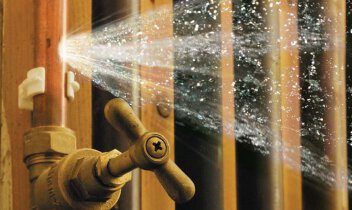
What Can Happen When Frozen Pipes Thaw?
When pipes freeze and unfreeze, it can lead to significant damage to your home and its plumbing network. Learn more about what can happen when frozen pipes thaw.
What Happens When Pipes Freeze?
Pipes will likely freeze when the temperature drops to 32°F or below and become even more likely to freeze when the temperature gets to 20°F or below. When pipes freeze, there is a chance that your pipes could potentially burst as a result of cracks caused by the freezing. When your pipes have been exposed to freezing temperatures for multiple hours, it increases the chance that your pipes could burst. Burst pipes are a serious problem and can lead to even more damage in your home including water damage that can cause even more issues such as mold, high utility bills and fluctuating water pressure. Even a single frozen pipe that bursts can cause thousands of dollars in damage.
What Happens When Frozen Pipes Thaw?
When the water freezes, it expands and can split or break the pipes. This can cause a major problem when the pipes thaw. When they thaw, the water at full pressure comes through and can flood your home which can cause significant further damage.
With temperatures expected above freezing, remember to do the following to minimize any possible damage from frozen pipes or other winter plumbing problems:
- Stay home if you can and be alert for the sound of running water. If you can’t stay home, turn off your water until you return.
- Make sure you know where to turn off the water to the whole house. Just a couple of minutes of water coming from a broken pipe can cause thousands of dollars of damage.
- If you have shut-off valves that can isolate the area where the frozen pipes are, turn them off as soon as possible.
- If you suspect a pipe has burst, it is best to call in a plumber as soon as possible to mitigate any damage to your home.
Will Frozen Pipes Thaw On Their Own?
If your pipes freeze, you may consider just waiting for your pipes to thaw and unfreeze themselves. While pipes can naturally thaw over time, there are a lot of issues that arise from this risky method. Depending on the weather and climate in your area, pipes can take a long time to unfreeze themselves. Frozen pipes will not unthaw unless the outside temperature rises above freezing for multiple hours – even up to six hours in total. Additionally, the melted water can simply freeze over again and cause further damage to the pipes, resulting in costly repairs.
Pipes can also burst when they freeze or after they thaw. So while your plumbing can naturally thaw, it is a dangerous gamble. Instead of waiting for pipes to naturally unthaw, it is better to deal with frozen pipes as soon as possible by receiving a plumbing service from a reliable plumbing company like Ranck Plumbing, heating & Air Conditioning.
Methods to Prevent Your Pipes From Freezing
Fortunately, there are some proactive measures you can take to help prevent your pipes from freezing in the first place. Some of the best tips to prevent pipes from freezing include:
- Letting Water Drip: Running some hot and cold water at a slow rate can help keep the temperature of your pipes higher to prevent freezing. The best way to do this is to let warm water drip overnight to keep the pipes warm and avoid overnight freezing.
- Insulate Your Pipes: Another method is to install pipe insulation where your pipes are exposed and susceptible to freezing. Insulating your hot water pipes can also reduce heat loss and make your water heating more efficient! The most common form of pipe insulation is foam tubing that encases the pipes. It is generally the most inexpensive option and it is easy to install.
- Use Heat Tape or Heat Cables: Heat tape and heat cables can be used to wrap around pipes and keep both the pipes and water warm to prevent freezing. Heat cables rely on electrical currents to assist in raising the temperature of pipes, so make sure to use products that have been tested and strictly follow all manufacturer installation instructions.
- Seal Air Leaks: If you have leaks that let cold air into your house, it can increase the chances of your pipes freezing over. Find any leaks that could be letting cold air in and thoroughly seal them throughout your home. You can most often find these air leaks around your pipes or any electrical work. Most times, you can use caulk or plaster to quickly cover any leaks!
- Adjust Your Thermostat: Variations in your thermostat settings can increase the risk of frozen pipes. A good rule of thumb is to set your thermostat to a consistent temperature during the day and night, particularly when the weather is especially cold.
Contact Ranck Plumbing, Heating & AC in Lancaster, PA
If you believe you have a burst pipe, we have emergency services available to send a plumber to your home as soon as possible. Call us at 717-397-2577 or contact us online to schedule an appointment!